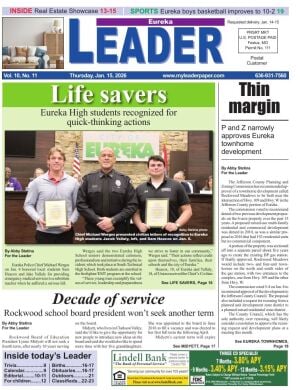The Grandview R-2 School District has joined a lawsuit against the State of Missouri and Attorney General Catharine Hanaway challenging the constitutionality of a portion of Senate Bill 3 that would cap or freeze property taxes. The cap or freeze on taxes would affect the amount of revenue some school districts, emergency services agencies and other tax-funded entities receive since property taxes would no longer be allowed to increase as they could under current laws.
The most widely publicized part of SB 3, also known as the “Show-Me Sports Investment Act,” calls for the Kansas City Chiefs and Royals stadium owners to receive financial incentives to remain inside Missouri state lines. One of these incentives includes a reimbursement by the state for up to 50 percent of stadium construction or renovation costs.
Gov. Mike Kehoe signed SB 3 into law during a special legislative session in June.
The bill also includes the property tax provision, and in the lawsuit, filed in Cole County Circuit Court on Sept. 26, the plaintiffs argue that Section 137.1055, or the “Homestead Property Tax Credit,” violates several articles of the Missouri Constitution by arbitrarily dividing taxpayers without any rational basis.
“Instead, individual legislators were allowed simply to dictate how their county would be designated within the bill – choosing whether to impose a freeze, a cap, or exclude the county entirely,” the lawsuit alleges.
Under the property tax credit part of the bill, 97 of Missouri’s 114 counties must ask voters whether to enact a property tax credit cap or freeze by the April 2026 municipal election.
The 97 counties are split into two categories: either zero-percent counties or 5-percent counties.
In 22 counties, residents will be asked to freeze property tax payments at the current rate, including Jefferson, Franklin and St. Charles counties. In another 75 counties, residents will be asked to vote on a property tax cap of no more than 5 percent, including Ste. Genevieve, St. Francois, Washington and Cape Girardeau counties.
The other 17 counties will not be required to freeze or cap property taxes, including those that include large economic hubs, such as St. Louis, Kansas City, Columbia, Jefferson City, the Lake of the Ozarks, Rolla and Springfield.
Explanation
In addition to the Grandview School District, other plaintiffs named in the lawsuit include the Warren County R-3, Crawford County R-1, Ozark R-6, Meramec Valley and Doniphan R-1 school districts, as well as the Ozark Fire Protection District and St. Louis County resident Alois Kirchhofer, and Warren County resident Virginia Schenck.
Two St. Louis-based law firms – the Mickes O’Toole firm and the Tueth-Keeney Cooper Mohan and Jackstadt firm – jointly filed the lawsuit on behalf of the plaintiffs.
Officials from several other Jefferson County school districts voted to join the lawsuit, including Crystal City, De Soto, Dunklin R-5, Festus R-6, Fox C-6, Hillsboro R-3, Jefferson R-7, Northwest R-1 and Windsor C-1, but they are not listed as plaintiffs in the case.
During a July 30 meeting, the Grandview Board of Education voted 6-1 to join the lawsuit. They are represented by Natalie Hoernschemeyer, an attorney from Mickes O’Toole.
Jim Layton, an attorney from Tueth Keeney, said the decision about which plaintiffs were named in the lawsuit came down to a combination of the interest of being named in the lawsuit and the desire to have plaintiffs in different parts of the state with varying circumstances.
Although her client and one of the plaintiffs – Kirchhofer – is from one of the unaffected counties, Hoernschemeyer said SB 3 creates problems across the entire state.
“All the plaintiffs stand together in opposing an unconstitutional law that divides taxpayers arbitrarily and without any rational basis,” she said.
In a statement provided to the Leader, Hoernschemeyer argued that SB 3 is deeply harmful to Missouri communities.
“Local schools and essential services in Missouri are funded primarily by property taxes, revenue approved by local voters to stay in their communities. Section 137.1055 carves the state into completely arbitrary categories that allow some taxpayers to be locked into a freeze, others capped and others unaffected, even if they live in the same school district,” she said. “That means neighbors across a county line can pay under completely different tax rules for the very same services. That kind of unequal treatment not only destabilizes school funding but also cannot stand under the Missouri Constitution.”
Hoernschemeyer said the law would not save money at the state level and instead would pull revenue away from local schools, fire protection districts, libraries and ambulance services.
“These are the very services families count on every day. While the state continues to spend money, our local communities are being told to do more with less. That destabilizes budgets, undermines the will of voters who approved tax levels for their schools, and puts children and taxpayers at risk,” she said.
Hoernschemeyer said the case was filed to protect Missouri families and ensure fair taxation.
“The Constitution requires uniform treatment and stable funding, and that is what our clients school districts, fire districts, and local taxpayers are asking the court to restore,” she added.
According to the lawsuit, the plaintiffs are asking that the property tax cap/freeze portion of the bill be declared unconstitutional and thrown out. If that provision isn’t eliminated, then as an alternative the plaintiffs want the General Assembly to provide restitution to the affected counties/taxing districts that would be impacted by the property tax cap or freeze.
Other legal challenges
SB 3 has also faced other challenges in court. On July 31, State Sen. Mike Moon from Ash Grove, State Rep. Bryant Wolfin from Ste. Genevieve and activist Ron Calzone filed a lawsuit against SB 3 to repeal the law in its entirety because of its unconstitutionality.
On Sept. 8, attorneys for Gov. Kehoe filed a motion to dismiss the lawsuit Moon, Wolfin and Calzone filed, stating that the plaintiffs lack “taxpayer and legislative standing to challenge Senate Bill 3.”
A hearing for the motion was scheduled for Sept. 30, after the Leader deadline.




